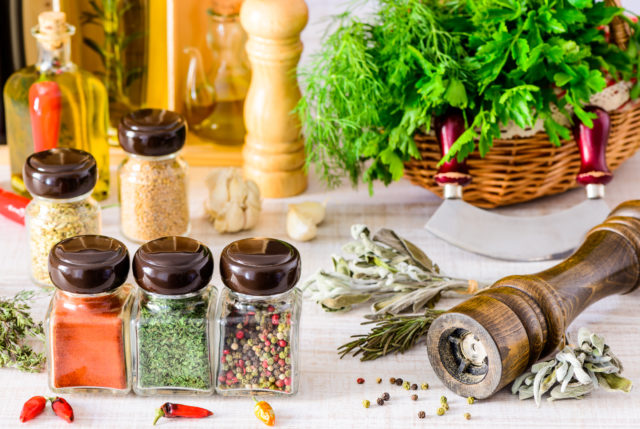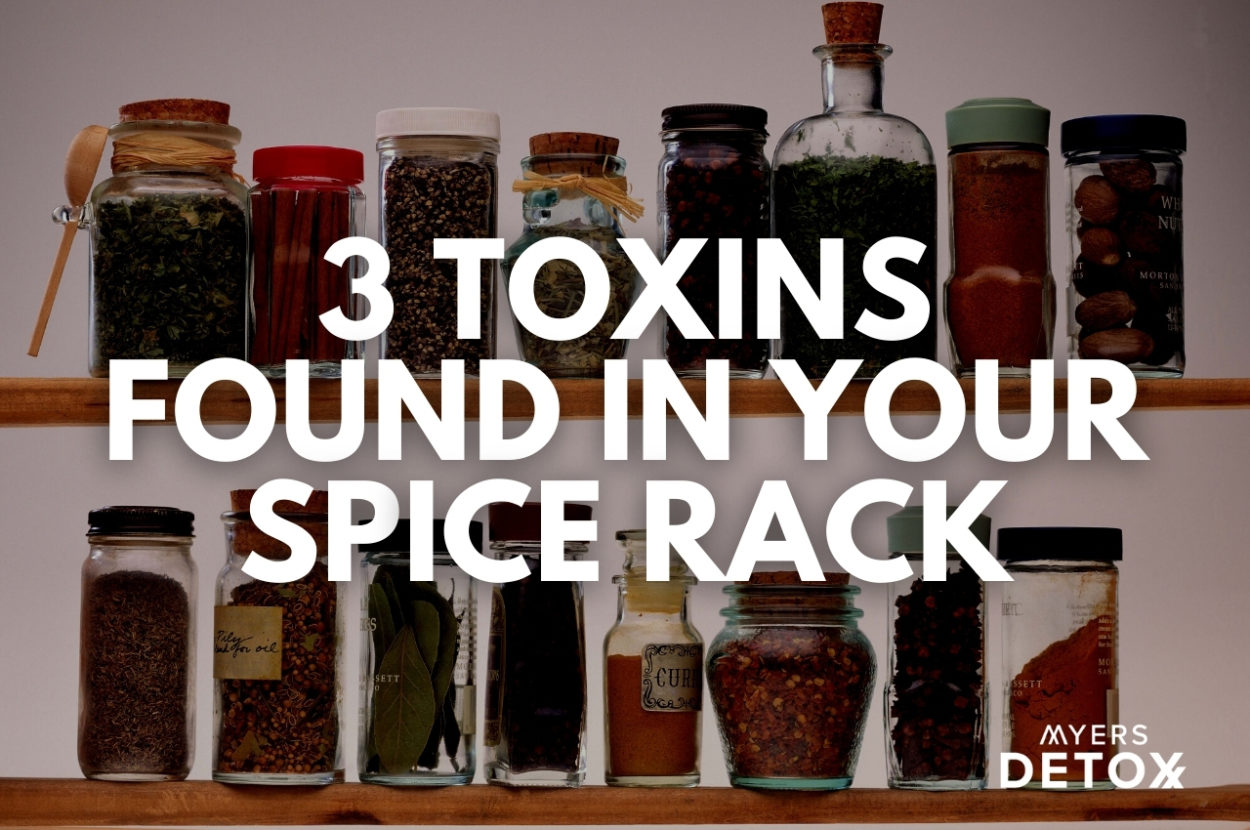Even the most novice chef has a spice or two in their back pocket that they throw into their meals to give it that little extra flavor. Spices have been a cornerstone of diets around the world for thousands of years, with many of them providing significant health benefits along with their unique flavors.
But like many things in the natural world today, spices aren’t exactly what they used to be. Due to environmental pollution and high levels of toxins in our soil, the spices you use regularly could be a source of dangerous heavy metals.
In this article, you’ll learn:
- Which brands and spices to watch out for
- Why even small amounts of heavy metals are cause for concern
- How to safely shop for spices
- What to do if you and your family have been unknowingly consuming toxic spices
Are There Heavy Metals In Your Spices?
A recent Consumer Reports investigation found some startling and disturbing data regarding the number of heavy metals found in common spices. The study looked at 126 individual products from both national and private-label brands, including some of the big names like Great Value (Walmart), La Flor, McCormick, Penzeys, Spice Islands, and Trader Joe’s.
The spices under investigation included basil, oregano, thyme, black pepper, chili powder, coriander, cumin, curry powder, garlic powder, ginger, paprika, saffron, sesame seed, turmeric, and white pepper.
The report found:
- Roughly one-third of the tested products, 40 in total, had high enough levels of arsenic, lead, and cadmium combined, on average, to pose a health concern for children when regularly consumed in typical serving sizes. Most raised concern for adults, too.
- All samples of thyme and oregano had levels of metals that Consumer Reports experts say are concerning.
- In 31 products, levels of lead were so high that they exceeded the maximum amount anyone should have in a day.
Perhaps most disturbing of all, there was no single predictor of which products contained higher levels of heavy metals. Even the “organic” label or “packed in the USA” meant nothing when it came to levels of metals in the product.
This leads to an even greater issue when dealing with our food supply. All of these labels and certifications are meant to keep us safe and aware, yet somehow we can’t seem to avoid metals.
The report went on to explain that even small amounts of these spices can result in a heavy metal load due to the frequency with which many people use spices.
Dangers Of Heavy Metals
You may be wondering how heavy metals got into your spices in the first place. Unfortunately, if there are metals in the soil or water where any food is grown, you can bet that it will end up contaminated. Today we have more heavy metals in our environment than ever before due to industrial pollution, domestic waste, pharmaceutical products, along with atmospheric sources[1].
What’s more, spices may pick up heavy metals during the manufacturing process from equipment or packaging.
Laura Shumow, executive director of the American Spice Trade Association, told Consumer Report that it’s almost impossible to rid herbs and spices of all heavy metals because of “the unavoidable presence in the environments where they are grown.”
While your body is naturally set up to detoxify itself of unwanted compounds via the liver, kidneys, lymph, and skin, heavy metals are incredibly difficult to break down and excrete, which means that even small amounts can build up quickly.
Once ingested, your body works to remove heavy metals from your blood by compartmentalizing them into cells and tissues. Unfortunately, there is no place in your body that is safe from the toxic effects of metals and once they’re sequestered away the metals bind to proteins. This binding destroys the protein molecule and disrupts the function of the cells – causing a wide range of downstream health concerns[2].
Research shows that heavy metal exposure can disrupt the central nervous system, leading to mental disorders and degenerative neurological diseases like Alzheimer’s. Metals may also damage your lungs, kidneys, liver, and other vital organs, promoting several diseases in these organs that may reach your body systemically.
What’s more, some metals can mimic hormones causing fertility issues and disrupting endocrine activity[3].
The three heavy metals found in most abundance in spices include lead, arsenic, and cadmium.
Some signs and symptoms associated with the toxicity of these metals include[4][5][6]:
1. Lead
- Abdominal pain
- Constipation
- Fatigue
- Depression
- Headache
- Distracted/ Forgetful
- Irritable
- Nauseous/Sick
- Pain or tingling in the hands and/or feet
- Weakness
2. Arsenic
- Vomiting
- Abdominal pain
- Diarrhea
- Muscle cramping
- Tingling of extremities
- Skin pigmentation changes
- Skin lesions
3. Cadmium
- Vomiting
- Diarrhea
- Stomach cramps
- Shortness of breath
- Flu-like symptoms (body aches, chills)
- Weakness
While these symptoms tend to show up in more acute toxicity, the long-term effects of heavy metal exposure are much more serious, as explained above.
Which Spice Brands To Choose?

At this point, you may be wondering if you can even spice up your food again. The good news is that although many spices were contaminated, there were plenty that showed little to no levels of heavy metals present.
Below is a guideline of which brands and spices to avoid and which to stock up on. Almost all spices had at least one brand that was safe for consumption, with the exception of oregano and thyme.
Basil
Safe:
- Simply Organic Basil
Avoid:
- 365 Whole Foods Market Basil
- Great Value (Walmart) Basil Leave
- McCormick Culinary Ground Basil (Albahaca Molida)
- Sausage Maker Ground Basil
- Litehouse Freeze Dried Basil
- Morton & Bassett Basil*
- Spice Islands Sweet Basil
Black Pepper
All of the black pepper products tested showed that they were safe for consumption. These brands include:
- Tone’s Ground Black Pepper
- El Guapo Black Pepper Ground (Pimienta Negra Molida)
- Badia Ground Black Pepper (Pimienta Negra Molida)
- Casablanca Ground Black Pepper (Pimienta Negra)
- Trader Joe’s Organic Ground Black Pepper
- Kirkland Signature (Costco) Fine Ground Black Pepper
- Simply Organic Black Pepper
- Penzeys Spices Tellicherry Black Pepper Fine Shaker Grind
- Great Value (Walmart) Ground Black Pepper
- McCormick Pure Ground Black Pepper
Chili Powder
Safe:
- Morton & Bassett Chili Powder
- Spice Islands Chili Powder
- Simply Organic Chili Powder
- Badia Polvo de Chili Powder
- Swad Chilli Powder
- Good & Gather (Target) Chili Powder
- Gebhardt Chili Powder
- El Guapo Ground California Chili (Chile California Molido)
- McCormick Dark Chili Powder
Avoid:
- Great Value (Walmart) Chili Powder*
Coriander
All of the coriander products tested showed that they were safe for consumption. These brands include:
- Simply Organic Coriander
- Happy Belly (Amazon) Ground Coriander
- Badia Ground Coriander (Culantro Molido)
- Great Value (Walmart) Organic Ground Coriander
- Spice Islands Ground Coriander
- Morton & Bassett Ground Coriander
- Laxmi Brand Coriander Powder
- Penzeys Spices Coriander Ground
Cumin
Safe:
- Spice Islands Ground Cumin Seed
- Simply Organic Ground Cumin
- El Guapo Cumin (Comino)
- Morton & Bassett Ground Cumin
- McCormick Ground Cumin
- 365 Whole Foods Market Cumin Ground
Avoid:
- Bolner’s Fiesta Ground Comino (Cumin)*
- Badia Ground Cumin (Comino Molido)*
- Great Value (Walmart) Ground Cumin*
- Trader Joe’s Organic Ground Cumin
Curry Powder
All of the curry powder products tested showed that they were safe for consumption. These brands include:
- Simply Organic Curry Powder
- Great Value (Walmart) Organic Curry Powder
- Morton & Bassett Curry
- Spice Islands Curry Powder
- Jamaican Choice Jamaican Curry Powder
- McCormick Curry Powder
- Happy Belly (Amazon) Curry Powder
- Caribbean Rhythms Mild Curry Powder
- Badia Jamaican Style Curry Powder
Garlic Powder
All of the garlic powder products tested showed that they were safe for consumption. These brands include:
- 365 Whole Foods Market Organic Garlic Powder
- Lawry’s Casero Garlic Powder (Ajo en Polvo)
- McCormick Garlic Powder
- Simply Organic Garlic Powder
- Bolner’s Fiesta Garlic Powder
- Kirkland Signature (Costco) Granulated California Garlic
- Great Value (Walmart) Granulated Garlic
- La Flor Garlic Powder (Ajo en Polvo)
- Badia Garlic Powder (Ajo en Polvo)
- Spice Supreme Garlic Powder
Ginger
Safe:
- Simply Organic Ginger
Avoid:
- 365 Whole Foods Market Ground Ginger
- Great Value (Walmart) Organic Ground Ginger
- La Flor Ground Ginger (Jenjibre)
- Tone’s Ground Ginger
- Badia Ground Ginger (Jengibre Molido)
- Spice Islands Ground Ginger
- Morton & Bassett Ground Ginger
- McCormick Ground Ginger
Oregano
All samples of oregano tested high in heavy metals. Generally speaking, your best bet for oregano is to grow it yourself. Below are the brands that were tested and showed high levels:
- Simply Organic Oregano
- McCormick Ground Oregano
- Penzeys Spices Oregano Turkish
- Spice Islands Oregano
- Badia Ground Oregano (Molido)
- Sadaf Oregano Leaves (Origan)
- La Flor Ground Oregano
Paprika
Safe:
- Morton & Bassett Paprika
- Simply Organic Paprika
- Spice Islands Paprika
- 365 Whole Foods Market Paprika
Avoid:
- Great Value (Walmart) Organic Paprika*
- Badia Paprika (Pimenton)*
- Pride of Szeged Sweet Hungarian Style Paprika
- McCormick Paprika
Saffron
All of the saffron products tested showed that they were safe for consumption. These brands include:
- Pacific Plaza Imports Full Thread Spanish Saffron
- Krokos Kozanis Organic Greek Red Saffron in Filaments
- Vigo Imported Saffron
- Badia Pure Selected Saffron (Azafran)
- McCormick Gourmet All Natural Spanish Saffron
- Sadaf Pure, Premium Saffron Thread
Sesame Seed
All of the sesame seed products tested showed that they were safe for consumption. These brands include:
- Sincerely Nuts Sesame Hulled
- Woodstock Organic Sesame Tahini Unsalted
- Al Wadi Al Akhdar Tahina 100% Ground Sesame
- Grain Brain Organic Hulled Sesame Seeds
- Bob’s Red Mill Premium Hulled White Sesame Seeds
- Penzeys Spices Sesame Seeds White Hulled
- Roland Tahini Pure Ground Sesame Seed
- JFC Premium Roasted White Sesame Seed
- Sadaf Sesame Seed Raw
Thyme
All samples of thyme tested high in heavy metals. Generally speaking, your best bet for thyme is to grow it yourself. Below are the brands that were tested and showed high levels:
- Spice Islands Ground Thyme
- Morton & Bassett Ground Thyme
- McCormick Ground Thyme
- Tone’s Ground Thyme
- Happy Belly (Amazon) Ground Thyme
Turmeric
Safe:
- Laxmi Brand Turmeric Powder
- Spice Islands Turmeric
- Sadaf Turmeric Powder (Curcuma)
- Simply Organic Turmeric
- Badia Ground Turmeric (Curcuma Molida)
Avoid
- Kirkland Signature (Costco) Ground Turmeric
- Morton & Bassett Turmeric
- McCormick Ground Turmeric
- La Flor Ground Turmeric
White Pepper
All of the white pepper products tested showed that they were safe for consumption. These brands include:
- Great Value (Walmart) Organic Ground White Pepper
- Penzeys Spices White Pepper Indonesia Fine Ground
- Badia Ground White (Pepper Pimienta Blanca Molida)
- Morton & Bassett Ground White Pepper
- Spice Islands Ground White Pepper
- Sadaf Ground White Pepper (Poivre Blanc Moulu)
- McCormick Ground White Pepper
- La Flor White Pepper
Tips From Consumer Reports For Purchasing Spices
You don’t have to give up spices altogether, but just become a more wary consumer. In addition to focusing on the brands and spices mentioned above, here are some tips when picking out spices:
Focus On Spices That Tend To Be Lower In Metals
The CR investigation found that black pepper, coriander, curry powder, garlic powder, saffron, sesame seeds, and white pepper were generally lower in metals than some of the other spices. When possible, focus on these spices instead of venturing out with the higher-metal spices. This should help mitigate the guesswork as to whether the spice you’re picking up is high in metals or not.
Remember That It’s Not About The Brand
In a perfect world, higher-quality brands would produce higher-quality, metal-free products. Unfortunately, the report showed that heavy metals were found throughout the spice samples regardless of the brand. This means that if you have your go-to spice brand, it may be time to start branching out.
Keep In Mind That “Organic” Does Not Mean Heavy-Metal Free
While in most cases purchasing organic products equates to higher-quality products, the organic certification does not require testing for heavy metals.
Think Twice About Imported Spices
Although labeling of “manufactured in the US” did not ensure low levels of metals, the report did highlight that US brands may buy up the higher-quality spices, leaving the contaminated ones to be sold in the country of origin.
Grow Your Own
Of course, the ideal scenario would be to grow your own spices. This is especially relevant if you use a lot of basil, oregano, and thyme, as the report showed high levels of metals in all three of these spices.
While it may seem like a lot of work to grow your own spices, it’s actually pretty easy as long as you have the space in your kitchen. There is no need for an extensive backyard or garden; you can grow these spices right on your windowsill.
Do You Have Toxic Levels Of Metals In Your Body?
The reality of the situation is that we all have some level of heavy metal toxicity at this point. Exactly how much toxicity we have, on the other hand, depends on your exposure. If you’ve been using spices for a long time (as most people have), you may want to check your levels of heavy metals. This is twice as important if you have been using any of the high-metal brands and spices indicated in the report.
The quickest and most affordable way to determine if you have heavy metals in your body is a hair mineral analysis. The HTMA assesses not only which metals you have in your body but it will also show you which minerals are deficient. Together, this information is incredibly empowering as it can give you direction on how to both support your body’s natural detox mechanisms and supplement to maintain optimal health.
Takeaway
Today more than ever, it’s crucial that you become a wary consumer. Heavy metals and other toxins are everywhere in the environment, and it doesn’t look like things are getting better anytime soon. This does not mean you have to live in fear and resort to a “bland” life. If anything, it just puts an emphasis on becoming mindful and aware of what you’re consuming.
You can continue to enjoy all the spices you usually incorporate into your meals; just be sure that when you go to the store, you’re stocking up on the cleanest varieties.
If you have any concerns about heavy metal toxicity, be sure to order an HTMA to assess your current levels. Once you know which metals your body is holding onto, you can begin the process of supporting your body’s detox process and freeing yourself of their harmful effects.
*Please note that A Hair Mineral Analysis (HTMA) is not intended to diagnose, treat, cure, reverse, or prevent any disease. It is not intended to replace any other medical test(s) that may be prescribed by your medical doctor.










